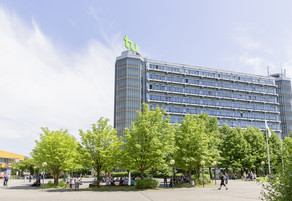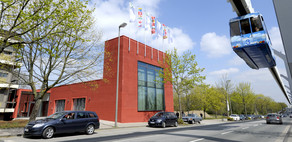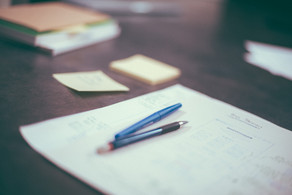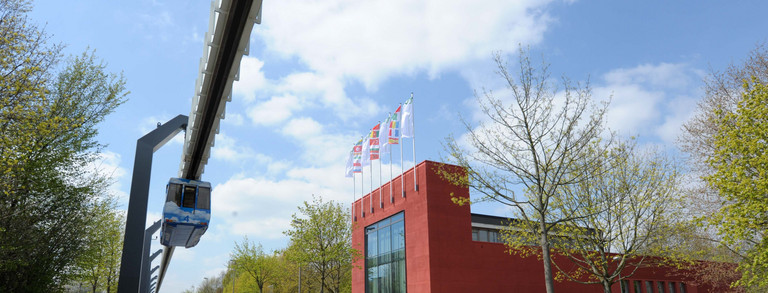Erasmus+
The EU education program Erasmus+ has been promoting cross-border mobility of students, university teaching and administrative staff since 1987. In addition, diverse cooperation and partnership programs offer far-reaching opportunities for institutional exchange between universities in Europe and worldwide.
A program generation in the Erasmus+ program always runs for six years. The current program generation has been running since 2021 and ends in 2027. This means that universities must submit an application to the Executive Agency in Brussels (EACEA) every six years, which TU Dortmund University successfully did in 2020. On the basis of this European Policy Statement, TU Dortmund University received an Erasmus Charter for Higher Education (2020) from the EU Commission. It proves that TU Dortmund University meets all the requirements for successful participation in the Erasmus+ program.
Further information on Erasmus+ can be found on the website of the European Commission and the German Academic Exchange Service (DAAD), the national agency for Germany. The DAAD provides information on current developments on its Erasmus+ (2021-2027) website.
The focus areas in the current Erasmus+ program are:
- Digital Transformation (Erasmus Without Paper (EWP))
- Inclusion and Diversity
- Environment and Combating Climate Change (Green Erasmus)
- Participation in Democratic Life (Civic Engagement)
The following information contains only the information for students and employees of TU Dortmund University.
Erasmus+ Key Actions at a Glance
Student and staff mobility is possible in KA131 with program countries. Erasmus+ Inter-Institutional Agreements (IIA) are required for exchange activities for study abroad, teaching staff mobility and Blended Intensive Programs.
There are already many existing Erasmus+ partner universities of the individual departments.
Internships abroad and staff mobilities are not linked to IIAs.
General information on this key action is available on the website of the German Academic Exchange Service (DAAD) (German).
With all the options offered by the Erasmus+ program, it is up to the universities themselves to set priorities and use the funds allocated to them as part of their own strategy. Students and staff at TU Dortmund University can therefore find out about the opportunities and framework conditions on the TU's own website:
- Study Abroad for Students (Bachelor, Master, Doctorate) (SMS)
- Internship Abroad for Students (Bachelor, Master, Doctorate) (SMP)
- Teaching Staff Mobility (STA)
- Staff Mobility for Non-Academic Staff and Erasmus+ Departmental Coordinators (STT)
- Blended Intensive Programs (BIP)
- International Mobility (IM)
Application | Coordination
The International Office (Erasmus+ Institutional Coordinator) applies centrally for funding from the Education, Audiovisual and Culture Executive Agency (EACEA).
The program is implemented in cooperation between the Erasmus+ Departmental Coordinators and the International Office.
Successful projects at TU Dortmund University
- since 1994 SMS and STA
- since 2007 in addition STT
- since 2008 in addition SMP
- since 2021 in addition BIP and IM
In the new program generation, universities have been given additional opportunities to financially support students and teaching staff (Outgoings) within the framework of the Erasmus+ program (KA131) if they carry out a mobility at a partner university in an Erasmus+ partner country.
Since the funds for this so-called "International Mobility" (i.e. simplified "outside Europe") are limited, TU Dortmund University sets criteria for the university-internal application through the International Office.
These criteria for the application and the application form can be found on Erasmus+ International Mobility.
Only staff members of departments can submit an application for their departmental-wide agreement to the International Office. It is not possible for students to apply directly at the International Office.
Application | Coordination
The International Office (Erasmus+ Institutional Coordinator) applies centrally for funding at the Executive Agency for Education, Audiovisual and Culture (EACEA).
Only Erasmus+ departmental coordinators can apply for funding together with those responsible for departmental cooperations at the International Office. It is not possible for students to submit applications themselves. The application deadline is March 31 for the following academic year.
For the funding of students and lecturers, an Erasmus+ Inter-Institutional Agreement (IIA) must be concluded for the exchange activities after approval.
The program is implemented in cooperation between the Erasmus+ departmental coordinators and contact persons for department-wide agreements and the International Office.
The Erasmus+ program enables not only Europeans to study, train and gain experience abroad, but also participants from outside the European Union. Since 2015, people and organizations from all over the world have been able to participate in Erasmus+ mobilities in the field of higher education.
This program line is currently not offered by TU Dortmund University for capacity reasons.
However, in order to support mobility to partner universities in Erasmus+ partner countries, Erasmus+ departmental coordinators together with those responsible for department-wide cooperation in a partner country can submit an application for outgoing mobility under certain conditions via Erasmus+ International Mobility within the framework of KA131.
Application | Coordination
The application process is currently suspended, but would be handled centrally by the International Office.
The International Office (Erasmus+ Institutional Coordinator) would apply centrally for funding from the Education, Audiovisual and Culture Executive Agency (EACEA (deadline: February). The application could only be made in cooperation with Erasmus+ departmental coordinators together with those responsible for department-wide cooperations for collaborations that have already been successfully implemented by departments over many years and can be integrated into strategic frameworks with regard to the regions. In addition, a department-wide cooperation agreement should already exist and it should be demonstrated that exchange activities have been actively carried out for several years.
If you have any questions, please contact Silke Viol.
Successful Projects at TU Dortmund University
Call 2022 (KA171)
- Application completed / Rejection
Call 2021 (KA171)
- No application possible
Call 2020 (KA107)
- Department of Human Sciences and Theology: Universitas Katolik Parahyangan (UNPAR), Bandung, Indonesia
- Department of Business and Economics: Ono Academic College (OAC), Kiyat Ono, Israel
- Department of Cultural Studies: The University of Social Sciences and Humanities Vietnam National University Ho Chi Minh City (USSH), Vietnam
Call 2019 (KA107)
- Department of Business and Economics: University of Sarajevo (US), Bosnien und Herzegowina
Call 2018 (KA107)
- Department of Human Sciences and Theology: Universitas Katolik Parahyangan (UNPAR), Bandung, Indonesia
- Department of Business and Economics: Ono Academic College (OAC), Kiyat Ono, Israel
Call 2016 (KA107)
- Department of Human Sciences and Theology: Universitas Katolik Parahyangan (UNPAR), Bandung, Indonesia
- Department of Biochemical and Chemical Engineering: Chulalongkorn University (CU), Bangkok, Thailand
Call 2015 (KA107)
- Department of Human Sciences and Theology: Universitas Katolik Parahyangan (UNPAR), Bandung, Indonesia
Here you will find a general program overview of the current Erasmus+ program generation (2021-2027) with links to the DAAD. An overview of all innovations in Key Action 2 in the current Erasmus+ program generation can be found on this DAAD page:
- Erasmus+ Cooperation Partnerships (KA220)
- Capacity Building
- Alliances
- Erasmus Mundus Joint Master and Erasmus Mundus Design Measures
- Jean Monnet-Activities
- Teachers Academies
Application | Coordination
Professors can submit applications directly to the Education, Audiovisual and Culture Executive Agency (EACEA). The Office of Research Support Services can provide assistance with the application process if desired.
Successful projects at TU Dortmund University in the Erasmus+ program generation 2021-2027:
Cooperation partnerships in vocational education and training (KA220)
Call 2024
- Department of Social Sciences (Geschäftsführung): LABS FOR CHANGE: "Social Innovation Labs for the promotion of equality, diversity, and non-descrimination in Higher Education Institutions" (5 participating universities and research institutions)
- Department of Social Sciences (Geschäftsführung): MERR: "Mental Resilience and readiness of healthcare professionals through effective management of the BurnOut effect" (6 participating universities and research institutions)
Call 2023
- Department of Spatial Planning (Univ.-Prof. Dr.-Ing. Frank Othengrafen): UPRUN: "Skills Expertise Urban Planning for Social Resilience in Urban Neighbourhoods. Transformative Change through Civic Engagement " (8 participating universities and reasearch institutions)
- Department of Business and Economics (Univ.-Prof. Dr. Liudvika Leišytė): InterHEd: "InterHEd Intersectionality in Higher Education" (4 participating universities)
- Department of Cultural Studies (Univ.-Prof. Dr. Susanne Fengler): CoMMPASS: "Communicating Migration and Mobility - E-Learning Programs and Newsroom Applications for Sub-Saharan Africa" (8 participating universities and reasearch institutions)
- Department of Social Sciences (Univ.-Prof. Dr. Jürgen Howaldt): SUNMENTORS: "Support for University Student Mental Health" (6 participating universities and reasearch institutions)
- Department of Social Sciences (Univ.-Prof. Dr. Jürgen Howaldt): EngageSDGs: "Teaching Staff" (12 participating universities and reasearch institutions)
- Department of Social Sciences (Univ.-Prof. Dr. Jürgen Howaldt): SMARTVILLE: "Developing Sustainable and Entrepreneurial Villages through Educational Living Labs in Namibia and Zambia" (7 participating universities and reasearch institutions)
- DoKoLL (JProf'in Dr. Carolyn Blume): ReaLiTea: "Research Literacy of EFL Teachers" (7 participating universities and reasearch institutions)
Call 2022
- Department of Mechanical Engineering (Univ.-Prof. Dr. habil. Michael Henke): EXPERTISE: "Experienced Purchasers Education Research Transfer for Industry 4.0 Skills Expertise" (participating countries: DE,FI,NL,SK)
- Department of Mechanical Engineering (Univ.-Prof. Dr. habil. Michael Henke): MachineLearnAthon "Developing Machine Learning Competencies for Interdisciplinary Teams at Universities"
Call 2021
- Department of Business and Economics (JProf. Dr. Simon Hensellek): Cowork4EU: "Coworking Best Practices for European Universities"
- Department of Rehabilitation Sciences (Univ. Prof. Dr.-Ing. Christian Bühler ): UPowerWAD: "Involving, empowering and training end users with disability to fully participate in the Web Accessibility Directive objectives"
Alliances for Innovation
Call 2024
- Department of Social Sciences (Geschäftsführung): Skills4EII: "Skills Alliance for the Green, Digital and Social Transformation of the Energy Intensive Industries" (34 participating universities, research institutions and companies)
Erasmus Mundus Joint Master (EMJM)
Call 2024
- Department of Architecture and Civil Engineering (Univ.-Prof. Dr. Angela Madeo): "Mechanics of Suitanable Materials and Structures (MS2)" (participating countries: DE,IT,FR)
Call 2022
- Department of Physics (Univ.-Prof. Dr. Kevin Kröninger): "Master of Science Advanced Methods in Particle Physics (IMAPP)." (participating countries: DE,IT,FR)
Details on the individual projects can also be found on the Erasmus+ Project Results Platform .
Susccessful Projects at TU Dortmund University in the Erasmus+ program generation 2014-2020:
Strategic Partnerships (KA203)
Call 2020
- Department of Social Sciences (Univ.-Prof. Dr. Jürgen Howaldt): ViSAS: "Virtual Social Art Stage"
- DoKoLL (JProf'in Dr. Carolyn Blume): ELLeN: "English Landuage Learning Neurodiversity"
Call 2019
- Department of Mechanical Engineering (Univ.-Prof. Dr. habil. Michael Henke): PERSIST: "Purchasing Education Research Syndicate: Industry 4.0 Skills Transfer" (participating countries: DE,FI,NL,SK,UK)
- Department of Social Sciences (Univ.-Prof. Dr. Jürgen Howaldt): SPIRE-SAIS "Skills Alliance for Industrial Symbiosis - A-Cross-sectoral Blueprint for a Sustainable Process Industry"
- Department of Social Sciences (Univ.-Prof. Dr. Jürgen Howaldt): ARTE: "The Art of Employability"
Call 2018
- Department of Mechanical Engineering (Univ.-Prof. Dr. habil. Michael Henke): Blocknet: "BlockChain Network Online Education for interdisciplinary European Competence Transfer" (participating countries: DE,DK,EE,LT)
- Department of Rehabilitation Sciences (Vertr.-Prof. Dr. Susanne Quinten): Creability: "Creative methods for an inclusive cultural work in Europe" (participating countries: DE,GR)
- Department of Social Sciences (Univ.-Prof. Dr. Jürgen Howaldt): ESSA: "Blueprint “New Skills Agenda Steel”: Industry-driven sustainable European Steel Skills Agenda and Strategy"
Call 2017
- Department of Physics: iTHEPHY: "Innovative Team-Teaching for Physics" (participating countries: DE,I,FR)
- Social Research Center Dortmund (sfs): JobActEurope
- Social Research Center Dortmund (sfs): SIKE "Social Innovation through knowledge exchange" (participating countries: CR,DE,ES,PT,UK)
- Department of Mathematics: LaMaVoc
Call 2015
- Department of Mechanical Engineering (Univ.-Prof. Dr. habil. Michael Henke): PERFECT: "Purchasing Education and Research for European Competence Transfer" | coordination TU Dortmund University (participating countries: DE,FI,NL,UK)
- Social Research Center Dortmund (sfs): CODEMOB: "Teaching coding and mobile devices in telecentres" (participating countries: BE,DE,ES,HU,HR)
Capacity Building
Call 2019
- Social Research Center Dortmund (sfs) (Kerstin Guhlemann): ARTE: "The Art of Employability Antonius" (participating countries: BE,CZ,DE,FI,IT,LT,NL,PL,ES,UK)
- Social Research Center Dortmund (sfs)(Antonius Schröder ): SPIRE-SAIS: "Skills Alliance for Industrial Symbiosis - A-Cross-sectoral Blueprint for a Sustainable Process Industry" | coordination TU Dortmund University (many participating countries)
Call 2018
- Social Research Center Dortmund (sfs) (Antonius Schröder): ESSA: "Industry-driven sustainable European Steel Skills Agenda and Strategy" | coordination TU Dortmund University (participating countries: BE,CZ,FI,IT,LT,NL,PL,ES,UK)
Call 2016
- Social Research Center Dortmund (sfs): "Students 4 Change: Social Entrepreneurship in Academia" (participating countries: MX,CL,BR,CR,FR,CO,DE,ES,PT)
This key action is divided into different areas and calls. Here you will find an overview about the program lines (in German).
Application | Coordination
Professors can submit applications directly to the Education, Audiovisual and Culture Executive Agency (EACEA). The Office of Research Support Services can provide assistance with the application process if desired.
Good to Know
In this factsheet, the EU Commission provides an overview of the opportunities and priorities in the new Erasmus+ program: Factsheet Erasmus+ (2021-2027) - only in German
Erasmus Code+ of TU Dortmund University: D DORTMUN01


![Eat & Read [Translate to English:]](/storages/international/r/Bilder/Veranstaltungen/Eat___Read/waffel_plain_buecherturm.jpg)









